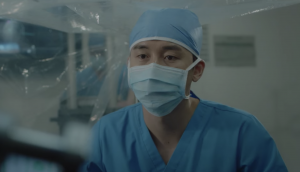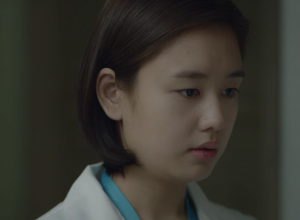
The latest drama from star writer-director combo Lee Woo-jung and Shin Won-ho (of Reply and Prison Playbook fame), Hospital Playlist began its run on March 12 this year on both tvN as well as Netflix and has gained increasing popularity for its engaging storyline. An anticipated second instalment of the Wise Life series, the drama is a heart-warming and hilarious slice-of-life story that offers a fresh take at the all-too-familiar genre of medical Kdramas.
This review contains spoilers.
Hospital Playlist follows the daily lives of five professors, all of whom work at Yulje Medical Center. Our fabulous five include Lee Ik-Joon (played by Jo Jung Seok), a professor of general surgery, Ahn Jung-won (played by Yoo Yeon Seok), a paediatrics professor, Kim Joon-wan (played by Jung Kyung-ho), an obstetrics professor, Yang Seok-hyung (played by Kim Dae-myung) and a neurological professor, Chae Song-hwa (played by Jeon Mi-do). Given how they all specialise in different areas, the show features a sprawling cast of doctors and nurses who work with our main characters. While the huge cast might be difficult to get used to in the beginning, it definitely helps in the world-building, as viewers can be truly convinced that Yulje Medical Center is a real, lived-in hospital.
Furthermore, the attention to medical detail in this show is astounding. From the accurate discolouration of bruises on an abused victim to the way stitching is done in the operating theatre, Hospital Playlist captures these details and attempts to portray as realistic a picture of the hospital as possible. Nevermind the fact that average viewers would not pick up on these details (or even understand diagnoses and medical jargon), scriptwriter Lee Woo-jung was clearly determined to make this drama relatable to actual medical professionals, and if the trending videos of Korean doctors reacting to Hospital Playlist are anything to go by, she has succeeded.

Medical scenes abound in this drama, but the action rarely takes place on the surgical table. Rather, these scenes are used for character development, either to reveal aspects of a person’s personality or for moments of crucial character growth. In episode 7 for instance, neurological resident Ahn Chi-hong (played by Kim Jun-han) leads his first surgery but makes many mistakes due to a prior medical condition he had. Apart from him becoming stronger as a surgeon, the operation was a good avenue for his friendships with his colleagues and his mentor Song-hwa to be highlighted. It also gave viewers insight into the real reason he left the army and allowed him to have more depth even as a supporting character. Other examples include the show’s continual focus on the relationships between doctors and their patients. It conveys the nuance and difficulty of their communication, as doctors are cautious of giving too much hope and shy away from making promises to their patients, for fear that something might go wrong during the operation. As Jung-won wisely puts it, the only thing doctors can promise with certainty is that they will do their best.
Depth and a whole lot of emotions are derived from Hospital Playlist‘s premise. As doctors are faced with life and death situations daily, with one lapse in judgment or error potentially leading to serious consequences for each patient, this is a pathos the drama taps upon to create stories that are simultaneously heart-wrenching and heart-warming. Even as patients go in and out, viewers are able to empathise with their pain and the anxiety of their family members. The helplessness of parents watching their children suffer, the sincere love of a construction worker who asks for the most expensive treatment for his son even though it would cost him so much, the father who was devastated about missing his daughter’s wedding, the depression that comes with an inability to let go — the scenarios that this drama presents are so diverse, but they are all rooted in deep familial love, and there is no place better than a hospital to exhibit that.

Granted, the multiplicity of characters introduced could sometimes cause certain plot points and characters to seem very superficial, especially in the drama’s first few episodes. This stands out when compared to previous dramas like Prison Playbook and Reply 1988, both of which were extremely focused on a small cast (a few families in a neighbourhood, a bunch of cellmates in prison). The directing style of Hospital Playlist does not help matters either, given the way the show makes multiple back-and-forth jumps from department to department within the same episode. While this is consistent with how each day for such medical professionals can be quite hectic, it reduces the cohesiveness of each episode and affects its sense of purpose. Fortunately, with each new episode that is released, various dimensions are revealed not just about our leads but also about their colleagues, who become more fleshed out with each new story arc.
The characterisation of Choo Min-ha (played by Ahn Eun-jin), a resident in obstetrics, is probably the most successful example of this. When viewers are first introduced to her, she comes across as a judgmental and rash doctor with questionable green eye make-up. When she suddenly displays romantic interest in Seok-hyung after spending an episode complaining about him for his antisocial ways, it feels extremely rushed and confusing for her character. Over time, however, viewers gradually become emotionally invested in her character, strange make-up trends, and all, especially after witnessing different aspects of her personality and charm. Her responsibility to her patients shines amongst her colleagues and makes her an easy character to root wholeheartedly for. She, like the other potential romantic interests of our leads introduced in the drama, becomes significant as an individual and as a growing doctor, overshadowing her potential relationship with Seok-hyung.

It is safe to say that you can never know what to expect with this drama. Right from its first episode, Hospital Playlist subverts expectations by completely removing any hospital politics K-drama viewers would have come to expect, replacing it instead with a focus on an adorable 65-year long friendship between Joo Jong-soo and Jung Ro-sa (played by veterans Kim Kap-soo and Kim Hae-sook respectively). This pair’s scenes are almost as enjoyable as the scenes featuring the five friends, and it is simply beautiful to witness this friendship of a lifetime continue to strengthen, even as they both face spousal losses and the fears of growing old. In fact, the “parent” clique formed by Jong-soo, Ro-sa, Cho Young-hye (played by Moon Hee-kyung) and Joo Jun (played by Jo Seung-yeon) is a riot to watch, exemplified by the classic “Mafia Game” scene of Episode 5. These veterans really know how to steal the show even in the pockets of screentime that they get, and are wonderful additions to this cast.
Additionally, while there are seemingly many filler scenes of Hospital Playlist, the drama is actually very selective about the storylines it chooses to focus on. In the first two episodes, Song-hwa is cheated on by her fellow doctor boyfriend, Jun-wan struggles with an alcoholic girlfriend and Ik-joon’s absentee wife asks for a divorce. All of these are plot points that could easily have been used for dramatic fodder, but Hospital Playlist does not detract from its focus, choosing to skip past these events in an almost casual manner. For example, the next time we meet Ik-joon in a following episode, he is already a legally divorced single father. It feels almost strange that viewers do not get to see every part of this life-changing event for Ik-joon as is normally the case in K-dramas, but this format allows viewers to once again imagine that Ik-joon is a real, living person, with a life beyond what is shown on the screen. The drama keeps the spotlight on Ik-joon’s lovely relationship with his son, Woo-joo, even as it meaningfully deals with his emotional growth from this divorce in a later episode. Pleasant surprises like these reveal how assured the storytelling is, and keeps viewers focused on the storylines that matter the most.

The stars of Hospital Playlist are undoubtedly the five friends who form the heart of the drama. The chemistry between them absolutely sparkles and each scene featuring this friendship, both in the past and present, is extremely well-crafted. Just like real-life friends, they are always noisy, with multiple overlapping conversations going on at the same time. They fight over food, fight over who gets to sing at karaoke and fight over untold secrets. The best part? They are in a band. Just as Prison Playbook incorporated a sizeable amount of baseball into its depiction of prison life, music plays a big part here. The single most consistent part about each episode is the band practice the gang has in Seok-hyung’s fully equipped basement, and it is such a joy each week to witness them playing together. Their covers of nostalgic classic Korean songs both bring these songs a new life and allows viewers to reminisce (often with the characters) about their youth. While Jo Jung-seok and Jung Kyung-ho were initially already proficient at the electric guitar, Yoo Yeon-seok, Kim Dae-myung and Jeon Mi-do had to pick up their various instruments for this show. In particular, it is so lovely to see the pure, unadulterated joy on Yoo Yeon-seok’s face every time he plays the drums.
These band scenes are shot in such a way that highlights that the actors themselves are truly the ones playing these instruments. All too often we have actors who pretend to play the piano or the guitar but these close-up shots and the release of behind-the-scenes videos reveal the amount of genuine effort these actors poured into this project. It was clearly a great way for them to build chemistry with each other as well, as reflected in their utterly believable performance as best friends. Their instrumental performance of “Canon” remains their best band performance to date, and the complex skills each of them show off are admirable. Jo Jung-seok also gets to display his vocal chops each week, even releasing a successful remake of the classic “Aloha”. Ironically, although Jeon Mi-do is an award-winning musical actress, Song-hwa is an adorable, tone-deaf, lead-singer wannabe. Given how she is practically perfect in every other aspect, this one flaw of hers adds a lot of humour while also making her character more realistic.
This review would not be complete without some mention of the several love lines going on in the show. In her trademark style, Lee Woo-jung keeps viewers guessing about which couples (if any) will end up together. While these romances have created some absolutely squee-worthy moments (especially for Jun-wan), this drama keeps things refreshing by emphasising other types of love, such as familial love and the tight-knit friendship of the five. For instance, when Song-hwa’s boyfriend cheated on her, Jun-wan is the first to find out about it, and confronts the boyfriend, forcing him to tell Song-hwa the truth. In a normal K-drama, this gesture might reveal Jun-wan’s deeper feelings for Song-hwa, and indeed this pairing remains a popular ship among fans. Here however, it is presented as a platonic act, something that best friends would do for each other.

Similarly, in one of the most touching scenes of the drama thus far, Ik-joon goes to the clinic in the early morning with Song-hwa to get the results for her biopsy. He did this despite having worked the whole night because he knew that she would be afraid and wanted to support her. This action can be interpreted romantically or otherwise, but it remains consistent with the caring character of Ik-joon seen throughout the drama. The other friends also show their concern for Song-hwa in their own ways, revealed in a cleverly directed scene where they visit her office one by one asking about the results in their distinctive manners (i.e Jun-wan aggressively pushing open the door while Jung-won asks gently with a smile). The ambiguity of the fine line between romance and friendship is pushed to its limits here, and only time will tell how these relationships will develop in the future. Furthermore, there will reportedly be three seasons of this drama, so it is likely that many of these relationships will not be resolved or established by the end of this season alone.
So far, Hospital Playlist has been excelling at its balance of seriousness and fun, delicately addressing real issues of mortality, adultery, abuse, and depression while still providing moments of lightness and comedy. It speaks to the richness of this story that this review is barely able to cover the tip of what this show has to offer. There is also so much more to look forward to as this season comes to a close and several unanswered questions about the future of these beloved characters. The last 4 episodes of the drama promise hints of more serious conflicts occurring within the hospital and among the residents, and I fully expect Hospital Playlist to continue delivering quality content and a satisfactory ending for the season.
(Youtube, Images via tvN)


